Are you looking to craft the perfect recommendation letter for a veterinary school applicant? Writing such a letter can be daunting, but with the right structure and positive tone, you can make a significant impact on their application. It's essential to highlight the candidate's specific skills, experiences, and qualities that make them an ideal fit for veterinary medicine. So, let's dive into some helpful tips and a template that will guide you through the processâread more to discover how to create a compelling recommendation!

Applicant's personal qualities and characteristics
The applicant demonstrates exceptional commitment to animal welfare through volunteer work at local animal shelters. Compassion shines in their interactions, evidenced by the positive feedback from staff and rehabilitated animals. Strong communication skills contribute to effective teamwork during community outreach programs aimed at educating pet owners. A keen analytical mind is apparent in their academic achievements, particularly in biology and chemistry, showcasing the ability to grasp complex scientific concepts essential for veterinary medicine. Reliability is highlighted through consistent punctuality and responsibility in managing laboratory tasks during internship experiences, underscoring their readiness for the rigorous demands of veterinary school.
Academic performance and relevant achievements
A veterinary student's academic performance reflects their dedication and proficiency in essential subjects like biology, chemistry, and anatomy. Excellent grades, such as a GPA of 3.8 out of 4.0, often indicate strong analytical skills and commitment to learning. Relevant achievements may include participation in internships at animal shelters or veterinary clinics, where hands-on experience with diverse species, such as dogs, cats, and exotic animals, enhances practical skills. Active involvement in volunteer programs, like the local humane society, demonstrates compassion and a proactive approach to animal welfare. Leadership roles in organizations, such as the veterinary student association, can further highlight qualities such as teamwork, communication, and organizational skills critical for success in the field of veterinary medicine.
Experience with animals and veterinary skills
Working directly with animals fosters essential veterinary skills, crucial for aspiring veterinarians. Volunteering at local animal shelters, like the Humane Society, provides hands-on experience with diverse species, including dogs and cats. Assisting in routine care tasks, such as feeding and grooming, develops a strong foundation in animal husbandry. Medical knowledge enhances through shadowing veterinarians during examinations and surgeries, witnessing procedures on various animal sizes, from small breeds to large livestock. Participation in community clinics, often held in underserved areas, allows for practical application of skills while promoting public health and welfare. These experiences build confidence and compassion, vital traits for a future veterinary professional.
Interpersonal and communication skills
Veterinary school candidates often excel in interpersonal and communication skills, demonstrating empathy and understanding in diverse situations. Their ability to interact with clients (pet owners) can significantly impact veterinary practices, as conveying complex medical information in an accessible manner is crucial. For instance, effective communication during tense situations, such as emergency care for injured animals, fosters trust and eases clients' anxiety. Furthermore, these candidates work collaboratively with veterinary staff (including technicians and receptionists) to create a cohesive environment, ensuring that animals receive the best care possible. Additionally, community outreach efforts, such as educational workshops on responsible pet ownership, showcase their dedication to animal welfare and public education. These interpersonal skills are essential components in fostering positive relationships within the veterinary field.
Passion for veterinary medicine and long-term goals
Dedicated individuals often pursue veterinary medicine, driven by a deep-seated passion for animal welfare and health. Throughout their academic journey, aspiring veterinarians engage in extensive volunteer work at local animal shelters, gaining hands-on experience with diverse species, including dogs, cats, and small mammals. They frequently participate in veterinary internships or externships, utilizing their teamwork skills in high-pressure environments while learning from seasoned professionals in the field. Long-term goals often include specializing in areas such as surgery, emergency care, or exotic animal medicine, requiring perseverance and advanced training. Furthermore, many candidates aim to contribute to research initiatives focused on zoonotic diseases, enhancing public health while fostering the human-animal bond through compassionate care. Aspiring veterinarians approach their career ambition with unwavering commitment, aiming to improve animal healthcare and enhance the quality of life for pets and wildlife alike.
Letter Template For Veterinary School Recommendation Samples
Letter template of veterinary school recommendation for undergraduate applicants.
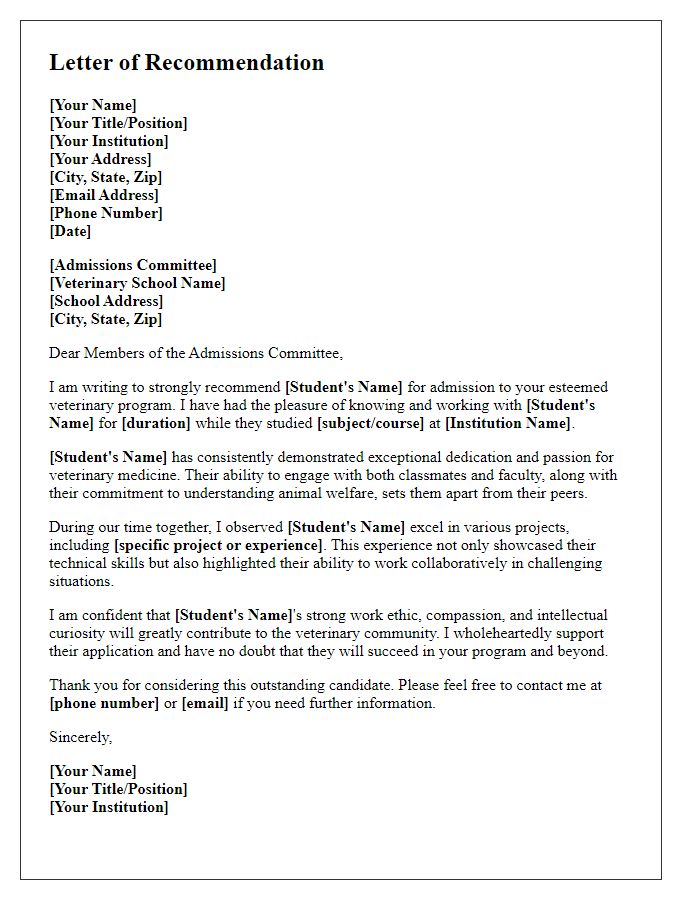
Letter template of veterinary school recommendation for international applicants.
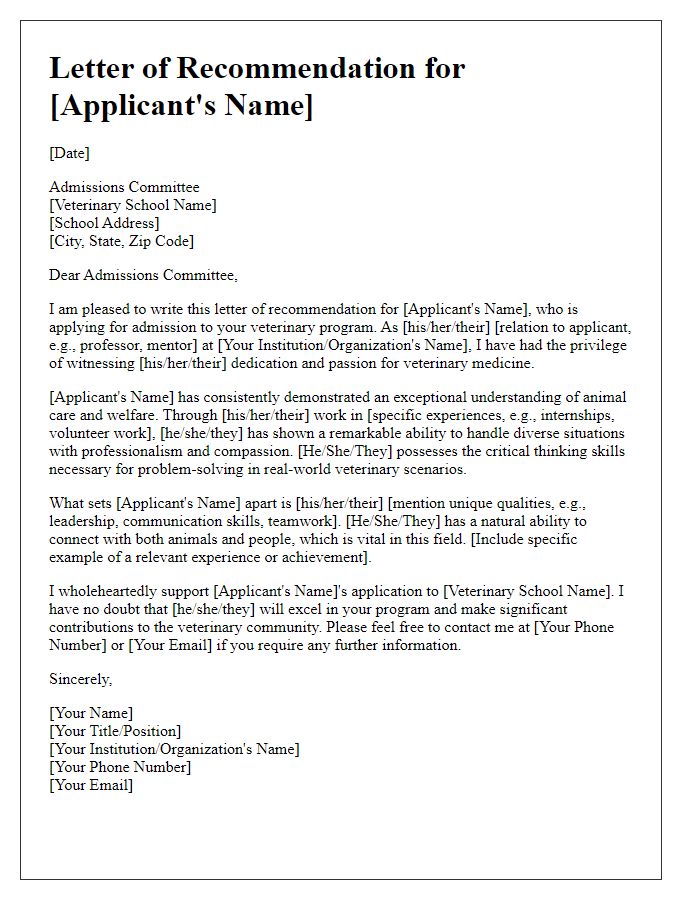
Letter template of veterinary school recommendation for research-focused candidates.
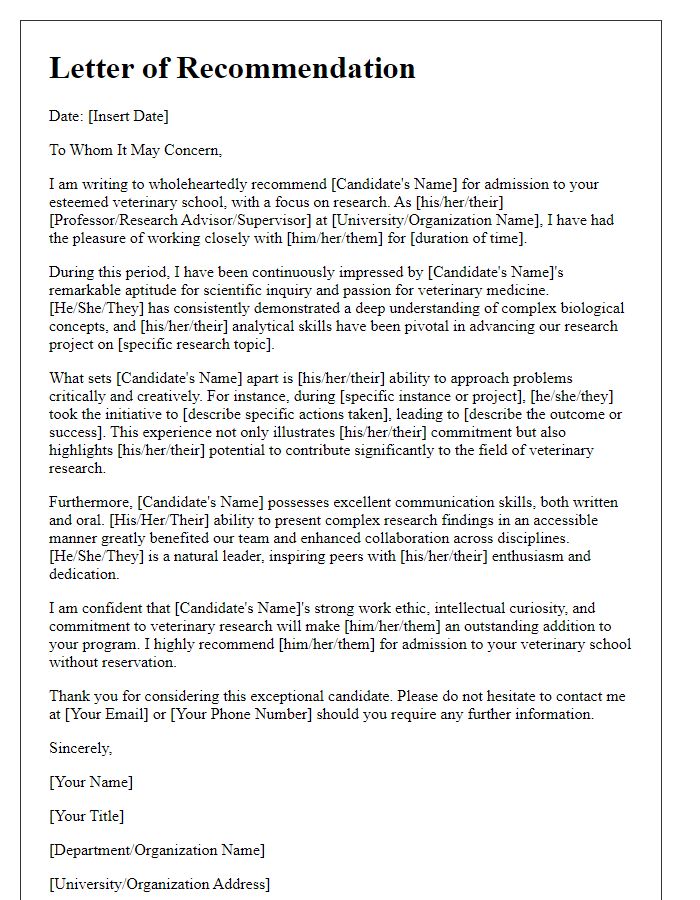
Letter template of veterinary school recommendation for students with volunteer experience.
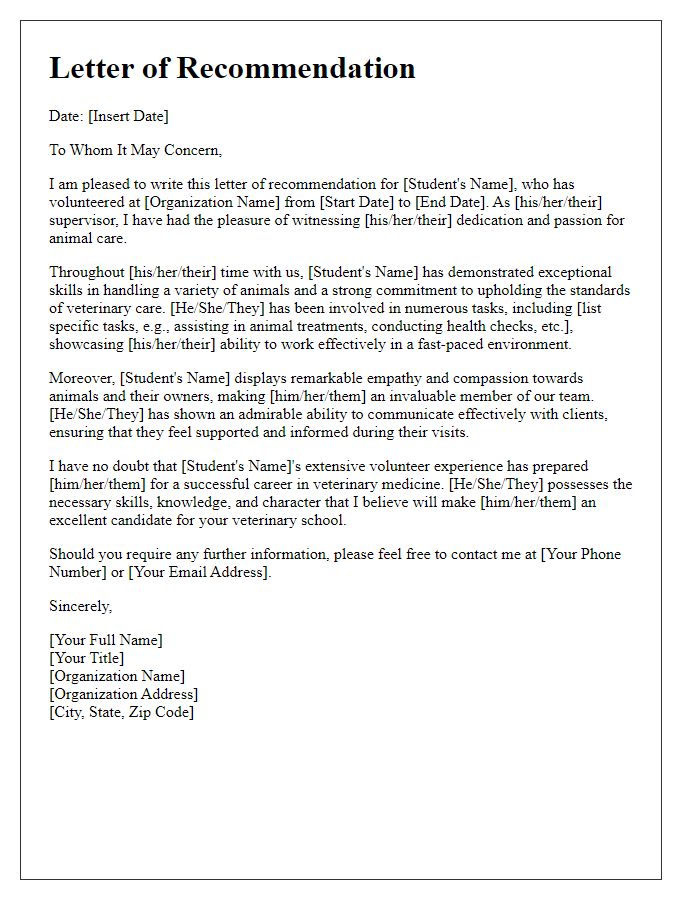
Letter template of veterinary school recommendation for candidates with strong academic backgrounds.
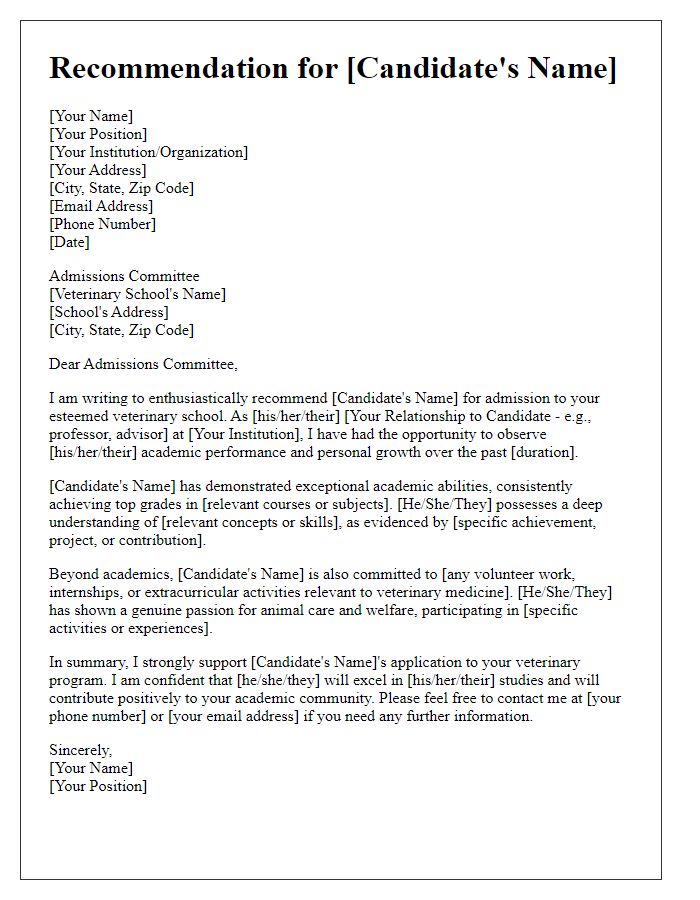
Letter template of veterinary school recommendation for applicants with leadership qualities.
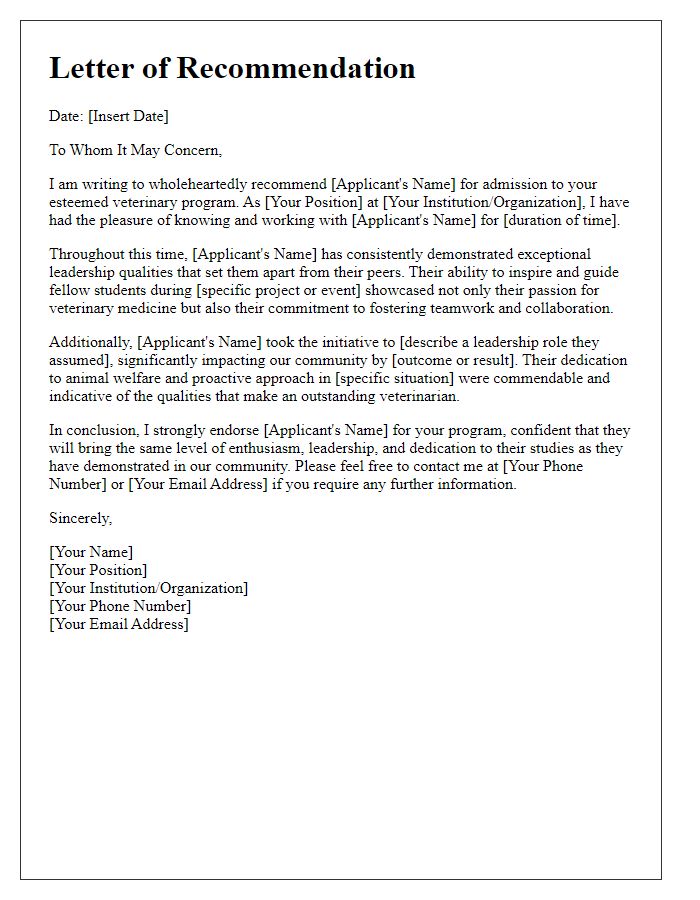
Letter template of veterinary school recommendation for those pursuing animal care careers.
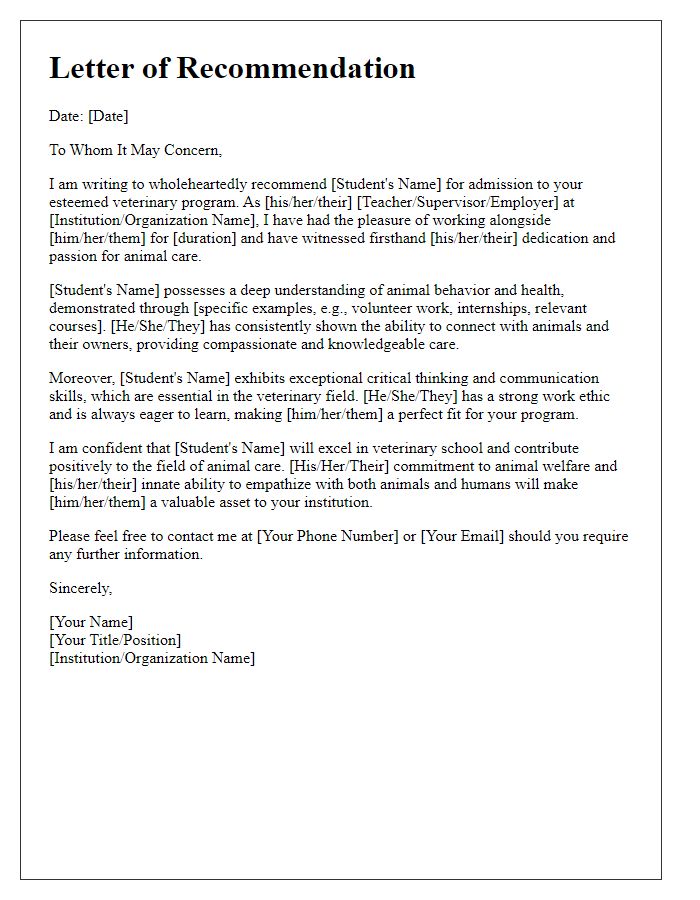
Letter template of veterinary school recommendation for community service-oriented individuals.
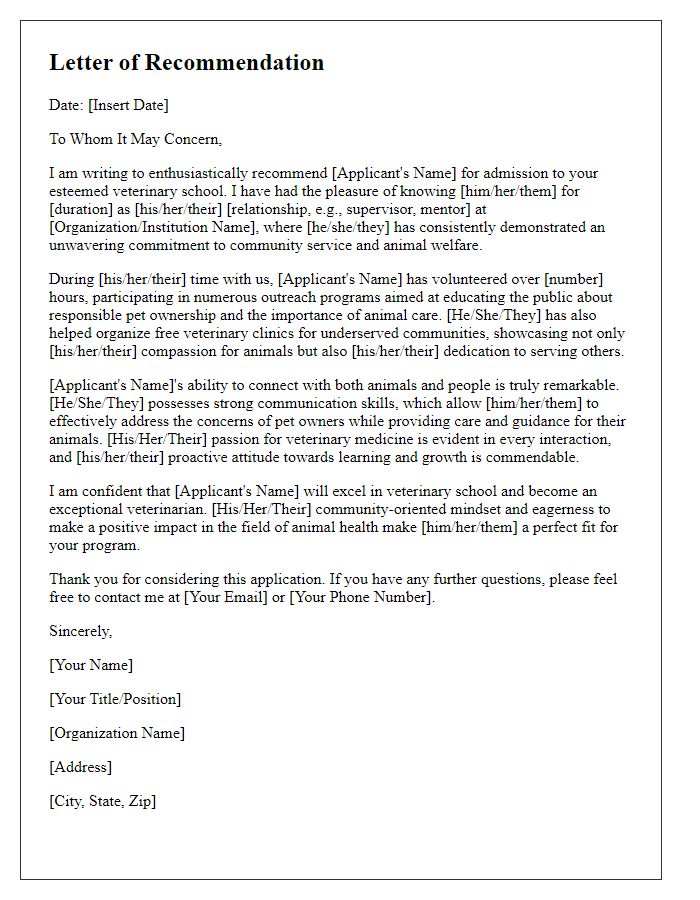
Letter template of veterinary school recommendation for candidates with hands-on veterinary experience.


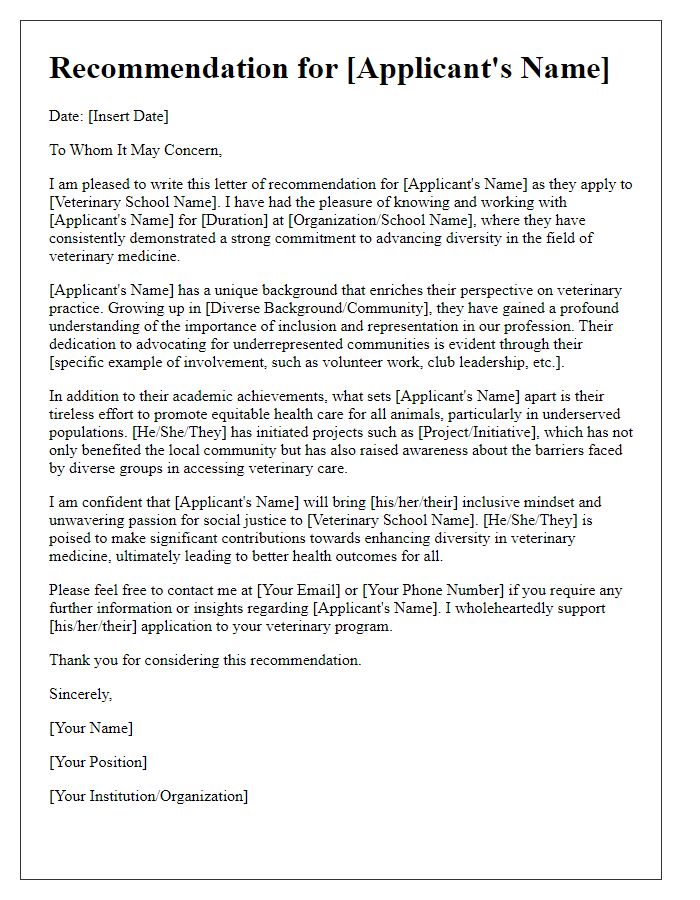


Comments